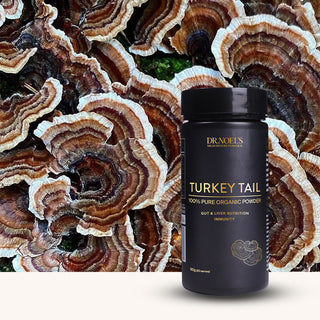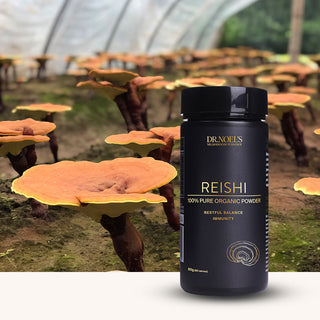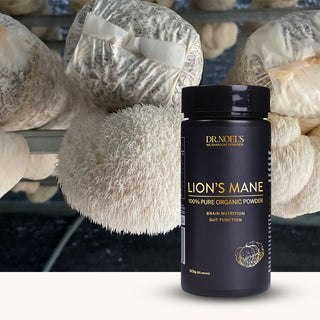If you’re one of the millions of people suffering from psoriasis, you may be looking for new and innovative ways to treat your condition. Reishi mushrooms have been used in traditional Chinese medicine for centuries, and recent studies have shown that they may be effective in treating psoriasis.
What Is Psoriasis?

Psoriasis is a condition that causes the skin to become red, itchy and scaly. It can affect any area of the body, but is most commonly found on the scalp, knees, elbows and lower back. Around 2% of people in the UK have psoriasis and it can occur at any age, although it is most commonly diagnosed in adults aged 20-40 years old. There is no cure for psoriasis, but there are treatments available that can help to reduce the symptoms and keep the condition under control.
The reported global prevalence of psoriasis in countries ranges between 0.09% and 11.4%, according to the World Health Organization (WHO).
What causes psoriasis?
The exact cause of psoriasis is not known, but it is thought to be related to an overactive immune system. In people with psoriasis, the body produces new skin cells at a faster rate than normal. These new skin cells build up on the surface of the skin, causing the red, scaly patches that are characteristic of the condition.
What are the symptoms of psoriasis?
The most common symptom of psoriasis is patches of red, scaly skin. These patches can be itchy and painful, and they may bleed if they are scratched. Psoriasis can also cause nails to become thickened or pitted, and joints to become swollen and painful. In some cases, psoriasis can also lead to psoriatic arthritis, which causes inflammation in the joints.
What are the traditional treatments for psoriasis?
There are a number of traditional treatments for psoriasis, including topical creams and ointments, light therapy and oral medications. Topical creams and ointments can help to reduce the redness and itching associated with psoriasis, while light therapy involves exposing the skin to ultraviolet light to slow down the growth of skin cells. Oral medications may also be prescribed to help reduce inflammation and psoriasis symptoms. A new method of treatment is biologic therapy, which involves using drugs that are made from living cells to target the immune system.
Reishi Mushrooms As A Natural Treatment For Psoriasis

Recent studies have shown that Reishi mushrooms can be effective in treating psoriasis. One study found that an extract from the mushrooms was able to reduce the redness, itching and scaling associated with atopic dermatitis. Another study found that Reishi mushrooms were effective in reducing the inflammation associated with psoriasis.
The potential anti-inflammatory effects of triterpenoids from Reishi (Ganoderma lucidum) were studied in this research published in 2019. Six new triterpenoids were isolated in this study and their inhibition of Nitric Oxide was examined. Compound 4 exhibited the most inhibition, therefore could be used as a potential anti-inflammatory candidate. Researchers concluded that Reishi might be developed as a value-added functional food for the prevention of inflammatory conditions.
The exact mechanism by which Reishi mushrooms work to treat psoriasis is not known, but it is thought that they help to regulate the immune system. Reishi mushrooms are a natural source of antioxidants and polysaccharides, which are believed to have anti-inflammatory properties.
Reishi is also rich in Ganoderic acid. This is a triterpene compound that has been shown to have anti-inflammatory, immune-modulating and anticancer properties. Ganoderic acid is thought to work by inhibiting the production of pro-inflammatory cytokines.
What Are The Benefits Of Ganoderic Acid For Psoriasis And The Skin?

Some preliminary studies suggest that ganoderic acid, a natural compound found in the Reishi mushroom, may offer some benefits for the skin. Ganoderic acid is an antioxidant, and it is thought to help protect the skin from damage caused by free radicals. Free radicals are harmful molecules that can damage cells and lead to inflammation.
Ganoderic acid is also an anti-inflammatory agent, and it is thought to help reduce redness and swelling. In addition, ganoderic acid is believed to stimulate collagen production, which can help improve the appearance of wrinkles and fine lines.
While more research is needed to confirm these potential benefits, ganoderic acid appears to be a promising natural option for keeping the skin healthy and youthful-looking.
Several allergic and inflammatory skin diseases, including psoriasis, can be a result of oxidative stress. That is why researchers investigated whether Ganoderic acids in Ganoderma lucidum were able to protect the cell from hydrogen peroxide-induced cell damage, in this 2020 study.
In this experiment, 6-hour exposure to 200 µM hydrogen peroxide reduced more than 35% of cell survival. When alcoholic extract of Reishi mushroom at 5 and 10 µg per ml doses were given, it reverted this trend, reducing the oxidative stress-induced injury to 15%. This antioxidant activity of Ganoderma lucidum may provide benefits in psoriasis.
How To Take Reishi Mushrooms For Psoriasis
Reishi mushrooms are available in a variety of forms, including capsules, powders and extracts. It is important to choose a product that is made from 100% pure Reishi mushrooms, as some products may contain other ingredients that could cause side effects. Reishi mushroom supplements can be found at most health food stores or online, but make sure you do some initial research for the best Reshi supplements.
If you decide to try Reishi mushrooms for psoriasis, it is important to start with a low dose first.
If choosing to treat psoriasis with Reishi supplements, its important to choose the highest quality Reishi powder in Australia.
Can Reishi make psoriasis worse?
There is no evidence that Reishi mushrooms can make psoriasis worse, but it is always best to start with a low dose and increase gradually as tolerated. If you experience any side effects, such as stomach upset, diarrhea or rash, stop taking the mushrooms and speak to your doctor.
Reishi mushroom supplements are generally considered safe for most people. However, they can interact with certain medications, so it is important to speak to your doctor before taking them.
Conclusion
Reishi mushrooms are a promising natural treatment for psoriasis. They are rich in antioxidants and polysaccharides, which are believed to have anti-inflammatory properties. Ganoderic acid, a natural compound found in Reishi mushrooms, may also offer some benefits for the skin. More research is needed to confirm these potential benefits, but Reishi mushrooms appear to be a safe and effective natural option for treating psoriasis.
Reishi mushrooms should be in conjunction with a holistic health program of nutrition, exercise and lifestyle, and should not be a substitute for any medication you are currently taking for psoriasis.
You may also be interested in how Reishi mushrooms may improve the symptoms associated with eczema.





